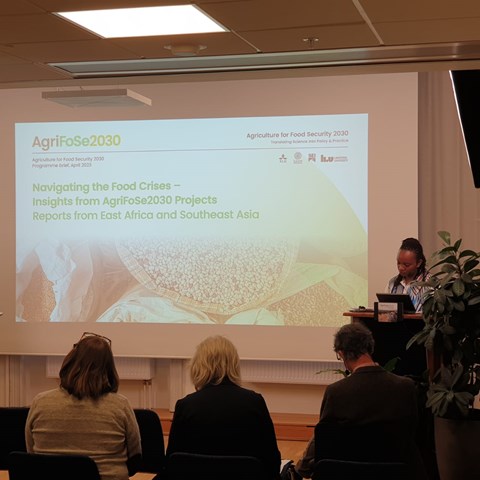At this event, the AgriFoSe2030 programme launched a perspective report showcasing how select projects are responding or adapting in times of crises and how their intervention is a sustainable solution to achieving resilient agri-food systems and ultimately, food security in their respective countries, more specifically, areas of the project.
"Despite the overwhelming evidence pointing towards the contribution of smallholder farmers to the urban food shed in cities of developing countries, smallholder farmers have often been excluded from policy and decision making processes that affect their operational environment. Yet, smallholder farmers are facing a multitude of climate-induced challenges including unpredictable droughts and flood patterns which hampers steady food production." - Frank Mugagga, Project Leader of the 'Unlocking the Potential of Smallholder Farmers in Mbale City and Kasese Municipality for more Resilient Urban Food Systems in Uganda (RUFS_Uganda).
Seven different projects were presented by each project leader:
- Transformation of pastoral livelihoods through enhanced capacity for adaptation of nutrition and commercialization policies to local context in West Pokot, Kenya.
- Improved governance of food systems in Nakuru and Kisumu Counties, Kenya.
- Participatory analysis of conventional agroecological intensification for increased productivity and sustainability in the coffee-banana systems in Uganda.
- Gender-based approaches for improving milk safety, value addition, and marketing among smallholder livestock farmers in western Uganda.
- Unlocking the potential of smallholder farmers in Mbale City and Kasese Municipality for more resilient urban food systems in Uganda.
- Engaging Vietnamese smallholder fruit farmers in e-commerce
- Digitalization of extension services for smallholder farmers in Southeast Asia
"What have we done in RUFS_ Uganda? We have done three things; 1. We have mobilised smallholder farmers into formal groups and platforms that can be supported by their respective local governments with technical and financial resources. 2. We have conducted resilience building trainings through which mobilised farmer groups are provided with relevant knowledge to guide their planning and farming activities. 3. We have facilitated peer-to-peer knowledge exchanges across the two urban authorities to expose stakeholders, especially the smallholder farmers, to new ideas, to expand their networks and to enable shared learning which are critical to transforming local urban food systems" - Frank Mugagga
Food insecurity remains a major challenge in many parts of the world despite economic growth and significant reductions in poverty rates in the past two decades. The Food and Agriculture Organisation (FAO) estimates that around 2.3 billion people are food insecure, and 827 million people are affected by hunger and malnutrition. These people are often smallholder farmers and found overwhelmingly in low-income countries in South and Southeast Asia and sub-Saharan Africa (SSA).
“We are experiencing a similar situation as East Africa with ongoing multiple crises. Now we have climate crises, degradation of land and water quality and also the fuel crisis that has impacted our members." - Irish Baguilat, AgriFoSe2030 advisory board member.
Since 2020, smallholder farmers have faced a number of domestic and global shocks including droughts, severe rainfall, value chain disruptions, economic shocks, crop and animal diseases, conflicts and COVID-19 related restrictions that have negative impacts on food systems. The project leaders presented results and ways to work to make local communities more resilient and how it is possible to work in different ways for capacity building.
"There are barriers, but there are also potential. There are opportunities that we also see for e-commerce and digital extension services." - Irish Baguilat
Mats Åberg from Swedish Development Agency gave some concluding remarks.
“I think reports like this will be useful. In 2021 was the Food System Summit, and we have the stocktaking events this July. In this process, we need good evidence on what works and what could assist the ways forward.”


 Selorm Kobla Kugbega, Dr
Selorm Kobla Kugbega, Dr